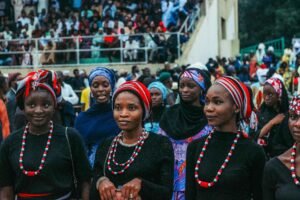The Influence of African Fashion on the Global Industry
African fashion is a vibrant tapestry woven from the continent’s rich cultural heritage, diverse ethnic backgrounds, and contemporary innovations. Over the years, this unique style has gained international recognition, significantly influencing the global fashion industry. This post explores the key elements of African fashion, its rise to prominence, and the ways it has shaped trends and practices around the world.
The Rich Tapestry of African Fashion
Traditional Textiles and Patterns
African fashion is renowned for its use of bold colors, intricate patterns, and rich textiles. Fabrics such as kente cloth, an Akan textile from Ghana, and mud cloth from Mali are just a few examples of traditional materials that carry deep cultural significance. These textiles often tell stories and convey messages about identity, heritage, and status.
Diverse Styles and Influences
Each region of Africa boasts its own distinct styles and influences. From the vibrant prints of West African fashion to the elegant draping of East African garments, the diversity is immense. Designers draw inspiration from local customs, creating contemporary pieces that honor traditional aesthetics while appealing to modern sensibilities.
The Rise of African Designers
Global Recognition
In recent years, African designers have garnered international acclaim, showcasing their work at prestigious fashion weeks and events worldwide. Designers like Adebayo Oke-Lawal, Ozwald Boateng, and Lisa Folawiyo have become household names, representing a new wave of talent that celebrates African culture.
Cultural Representation
African designers often use their platforms to address social issues, challenge stereotypes, and promote cultural representation. By incorporating traditional elements into their designs, they create a sense of pride and identity, allowing the world to see Africa’s richness and diversity.
The Impact of African Fashion on Global Trends
Bold Prints and Colors
African fashion’s signature bold prints and vibrant colors have made a significant impact on global fashion trends. High-profile fashion houses and designers are increasingly incorporating these elements into their collections, resulting in a fusion of styles that celebrate African aesthetics.
Sustainability and Ethical Practices
The emphasis on craftsmanship, sustainability, and ethical practices in African fashion has influenced global discussions about responsible fashion. Many African designers prioritize local artisanship, using sustainable materials and supporting their communities, prompting a reevaluation of production practices in the wider industry.
Street Style and Pop Culture
African street style has become a powerful force in global fashion. Influencers and celebrities often showcase traditional garments alongside contemporary pieces, creating a hybrid style that resonates with a diverse audience. This fusion has led to the rise of “Afrofuturism,” a cultural movement that envisions a future rooted in African history and aesthetics.
The Role of Fashion Weeks and Events
African Fashion Weeks
Fashion weeks across Africa, such as Arise Fashion Week in Nigeria and Africa Fashion Week London, provide platforms for emerging designers to showcase their talent. These events have become crucial for promoting African fashion on the global stage, attracting international buyers and media attention.
Collaborations and Partnerships
Collaborations between African designers and global brands have further cemented Africa’s place in the fashion industry. Partnerships that celebrate cultural heritage and craftsmanship are becoming more common, allowing for greater visibility and appreciation of African artistry.
The Future of African Fashion
Embracing Technology
As technology continues to evolve, African fashion is poised to leverage digital platforms for greater reach and impact. Online marketplaces and social media have enabled designers to connect with global audiences, bypassing traditional retail barriers.
Education and Training
Investing in education and training for aspiring designers is essential for the future of African fashion. Institutions dedicated to nurturing local talent can empower the next generation to innovate while honoring their cultural heritage.
Sustainability and Innovation
The future of African fashion lies in its commitment to sustainability and innovation. By embracing eco-friendly practices and championing local craftsmanship, African designers can lead the way in creating a more responsible fashion industry.
Conclusion
The influence of African fashion on the global industry is undeniable. Through its rich cultural heritage, innovative designs, and commitment to sustainability, African fashion is reshaping the way the world perceives style and creativity. As we celebrate the diversity and vibrancy of African fashion, we also recognize the importance of honoring its roots while paving the way for a future that embraces both tradition and innovation. This dynamic interplay not only enriches the global fashion landscape but also ensures that African voices continue to resonate loud and clear.














Publicar comentário